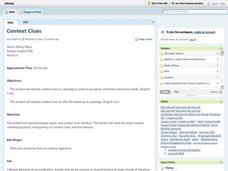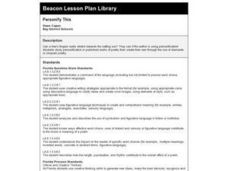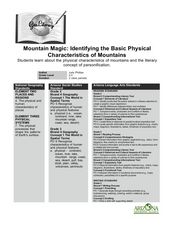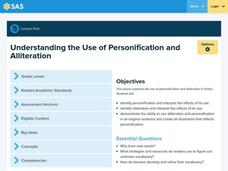Curated OER
Learning Intentions
What a helpful resource! This presentation could be used to review literary terms in the classroom. Learners view a series of slides defining the meaning of terms, such as personification, imagery, similes, metaphors, and alliteration....
Curated OER
Personification
The meaning of personification is the focus of this language arts presentation. Upper elementary writers are exposed to the concept of personification, then practice implementing the technique by adding color to the sentence, "Leaves are...
Curated OER
Context Clues
Work on context clues with your ninth graders in this lesson, which focuses on identifying and analyzing clues to define unfamiliar words. They identify context clues in a passage to recognize words they haven't seen before, and then...
Curated OER
Identifying Figurative Language #1
In this identifying types of figurative language instructional activity, students read sentences and phrases, determine if they are similes, metaphors, hyperboles, personifications, or a combination, identify the type/s and write an...
Curated OER
Figurative Language
Students interpret figurative language. In this language lesson, students are read the poem "I Love the Look of Words" by Maya Angelou and are to find examples of hyperbole and personification in the poem. Students then rotate among...
Curated OER
Animal Diaries
Students read Diary of a Worm by Foreen Cronin. In this journal writing instructional activity, students research an animal and write a diary by their animal. Students apply the research they've completed in their writings. Students...
Curated OER
Planet Pluto and Personification
In this writing prompt worksheet students are asked to use personification in discussing the redefinition of "planet Pluto" to "dwarf planet." Students are asked to communicate the feelings of the planet as it pertains to its...
Curated OER
Reading the Play
Middle schoolers read the play "Julius Caesar" by William Shakespeare. In groups, they identify the instances of similes, metaphors and personification. They use the Internet to compare and contrast the events in the play with historical...
Curated OER
Language Arts: Stylistic Devices
Students are able to define given literary terms, such as metaphor, simile, imagery, personification, symbolism, etc. They are able to identify the use of literary elements in a given text. Students are able to interpret weather...
Curated OER
Personify This
Eighth graders study personification in published works of poetry, then create their own through the use of diamante or cinquain poetry. They read and discuss poetry by Shel Silverstein, William Jay Smith, and Elinor Wylie.
Curated OER
Poetry: Simile And Figurative Language
Students explore websites that contain poems about autumn, winter, and the seasonal holidays and explore how similes and figurative language can be used in poetry.
Curated OER
Goddesses Are Personifications Too!
Students explore the use of personification as a way of expressing ideals. They transfer this understanding to the present by creating an allegorical depiction of a contemporary ideal or value inspired by precedents in the Neoclassical...
Curated OER
Poetry Elements
Need a quick review of some of the elements of poetry? Eleven key terms are defined and illustrated.
Curated OER
Mountain Magic: Identifying the Basic Physical Characteristics of Mountains
Students read about and identify on maps the physical characteristics of mountains. In this mountains lesson plan, students also write about the characteristics using personification.
Curated OER
Personification
Second graders recognize personification in texts. In this personification lesson plan, 2nd graders discuss figurative language and how characters can be given human-like qualities. Students read a story and write down examples they...
Curated OER
Lesson 1: Figurative Language
The story Once in a Blue Moon by Nicola Morgan is full of figurative language. Second graders choose one idiom from the story and create an illustration of its meaning. Handouts and structured vocabulary practice is included with the...
Curated OER
Review of Personification and Alliteration
Young scholars study personification and alliteration in various fiction texts. In this literary devices lesson, students use various texts to identify the literary devices of personification and alliteration. Young scholars use examples...
Curated OER
Identifying Figurative Language
Students explore figurative language. In this Fahrenheit 451 activity, students read the Bradbury novel. As they read, students note the simile, metaphor, and personification examples that they encounter.
Curated OER
PERSONIFICATOIN
In this personification worksheet, students first read a short description about personification. Students are then asked to underline words that represent a quality of a person. Finally, students look at words such as 'frog' and try...
Curated OER
Teaching Poetic Devices
High schoolers identify and analyze the poetic devices of alliteration, metaphors, onomatopoeia, personification, rhyme, and similes. They identify examples of each poetic device in songs, complete a worksheet, and teach the devices to...
Curated OER
Figurative Language 2
Students read nursery rhymes and advertisements to identify examples of figurative language. As a class, students discuss the use of figurative language and its effectiveness in advertising, children's books, rhymes, poetry, etc. ...
Curated OER
Personification
Fifth graders read opening pargraphs in their books and discuss with their peers the meaning of personification. They then identify three instances in the poem "Desert Tortoise" of similarities between humans and animals citing...
Curated OER
Figuratively Writing...It's for the Birds!
Learners identify and use literary devices such as personification, idioms, hyperbole, and metaphors. They identify one literary device and illustrate the meaning. They write a letter using correct letter format and incorporates literary...
Curated OER
Personification Stories
Students create a clay object in which they are to personify. They use their own personal experiences to help the viewer imagine what it would be like to be that particular object. They also watch videos of fables to help them with...

























